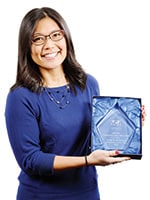Martha Funabashi, PhD, was named the American Chiropractic Association Researcher of the Year at ACA Engage 2023 in January. Her career has led her from an undergraduate degree in physical therapy to her current role as a clinical research scientist at Canadian Memorial Chiropractic College, with a variety of research opportunities in between.

No matter where her career has taken her, Dr. Funabashi is always learning something new. “I think one of the biggest lessons I learned was that I don’t have to know everything, and I won’t ever know everything,” she said. “There’s always room where I can improve — I can improve on how I’m doing my research, how I’m interacting with my team, how I’m mentoring students, how I’m presenting. Having that open mind was a big step for me and changed a lot about how I dealt with myself in certain situations.”
Dr. Funabashi credits the beginning of her love for research to her evidence-based undergraduate program at the University of São Paulo in Brazil, which required student research projects. “I had a lot of fun and learned a lot during that project,” she said. “That’s why I went ahead and did my master’s. I wanted to keep studying more about specific topics.”
She completed a master’s degree in neurosciences, also from the University of São Paulo, while practicing and learning more about manual therapy. “I got very interested in manual therapy because I was applying that on my patients and seeing some really interesting results that I wanted to learn more about,” she said. “When I saw the effects of manual therapy, the clinical, practical side, I wanted to learn more about how it worked and what it did to the body. That’s how I got into researching chiropractic.” This prompted her to pursue a PhD in rehabilitation sciences at the University of Alberta in Canada, with a research focus on the biomechanics of manual therapy.
“After that I did a postdoctoral fellowship in patient safety, and I think that’s when I got super passionate about both topics and wanted to combine them whenever I could,” she explained. Some of her favorite research projects have been the result of this combination.
One of the main projects Dr. Funabashi is currently conducting was inspired by her postdoctoral fellowship, where she worked with other researchers on clinical studies looking at implementing an active surveillance reporting system for adverse events in clinical practice. Throughout the process, they noticed a number of questions and concerns about their definition of adverse events. “Based on that, we did a scoping review to look at other studies that have been published and what they used as their definition of adverse events,” she explained. From this review, they noted that there was no one definition that was broadly used and accepted, so each study or team had its own definition.
“That triggered this other study that we’re currently working on,” Dr. Funabashi said. “We are getting expert opinions to standardize the definition for an adverse event following manipulations and mobilizations.” This study had almost 200 participants from all around the world, including chiropractors, physical therapists, osteopaths and other health professionals that use these manual therapy techniques.
According to Dr. Funabashi, clinical research like this comes with a unique set of challenges. “Research usually has a lot of details that we need to think about to make sure that we are answering the question with confidence and a certain level of rigor and quality,” she said. Condensing those details for publication and teaching is one of the biggest challenges for her. “Identifying and summarizing the key messages in a way that is helpful and clinically applicable, but also in a way that is true to the level of rigor of the research, is very challenging,” she said.
“There is no perfect study,” she noted. “All projects will have limitations, but they will also have strengths. I do my best and work hard to do good, robust, high-quality studies with as few limitations as possible, but at the same time accepting that there will be limitations and that’s okay.”
Dr. Funabashi encourages clinicians with an interest in research to get involved where they can. “The easiest way is probably participating in studies,” she said. “It usually requires not too much time and hopefully not too much effort, and the contribution that they will have will be super significant on the research side, even if it is just a little bit of data.”
She also recommends reaching out to the investigators on projects of interest. “I love when clinicians reach out if they have any ideas so we can work together to potentially come up with a project that would answer the questions that they have and that they see clinically,” Dr. Funabashi said. “Even though I have that clinical experience, I’ve been out of practice for 10 years now. Having that clinical point of view is so important.”
Ultimately, Dr. Funabashi says that, for her, the keys to research are making connections and having fun. “Introduce yourself to the people you would like to work with to share ideas or brainstorm,” she recommends. “Make sure that you’re working with something that you like so that you have that motivation. If you’re happier, you do better work, you have more fun, you learn more.”
